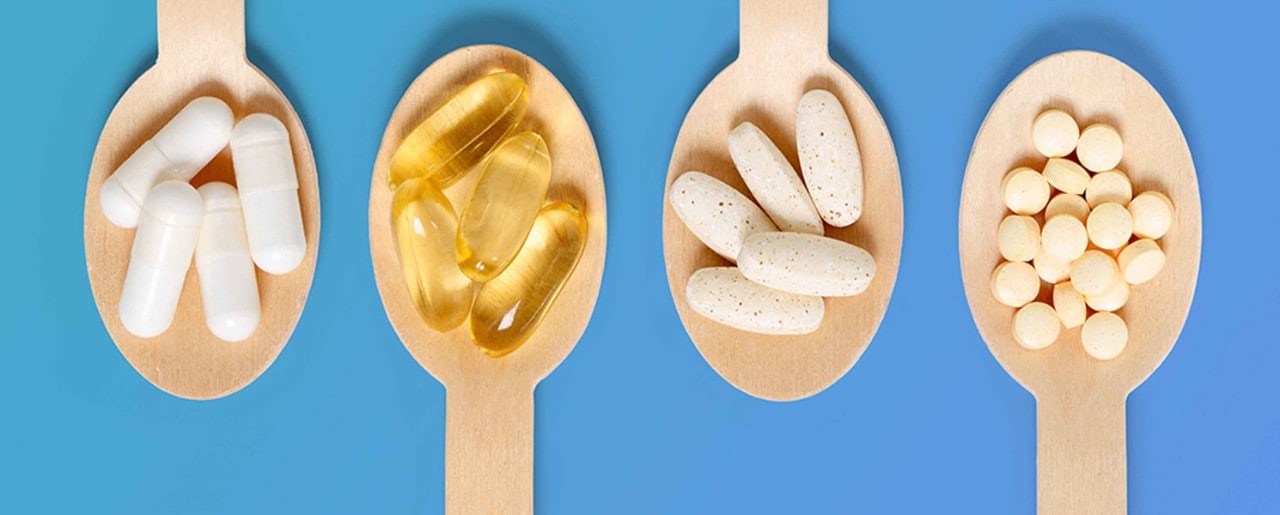Wellness
Boost your diet with the right supplements
By Nora Laberee Mar 20, 2024 • 6 min
The new year is always a great time to examine where you are and start fresh. According to the most recent Dietary Guidelines for Americans (2020-2025), there are a few key nutrients that many Americans are missing from their diets in proper quantities. Supplements can help some people reach their daily intake of these important nutrients. Remember, a supplement should be exactly that — a supplement to a healthy diet. Always eat nutritious foods first and then think about supplements. And, of course, check with your healthcare provider before you add any new supplement to your regimen.
Calcium
The most abundant nutrient in our bodies, calcium keeps our tissue strong and flexible, and it makes up most of our teeth and bones. It also helps our bodies with blood flow, blood clotting and releasing certain hormones. It's important for all of us to consume calcium in healthy amounts. Calcium is found naturally in many foods, such as yogurt, cheese, milk and salmon. It may be added to fortified foods such as orange juice and soy milk. Calcium is also available as a dietary supplement.
The recommended dietary allowance (RDA) of a vitamin or nutrient is the average level of daily intake that is sufficient to reach nutritional requirements for most people. The RDA of calcium is 1,000 milligrams (mg) to 1,300 mg for most people, depending on age. Evidence suggests that 40% to 50% of Americans may not get sufficient amounts of calcium in their diets.
If you have trouble getting enough calcium from your diet, a supplement may be the right choice. Supplements can come in many forms, such as multivitamins, calcium tablets and calcium supplements with vitamin D added. Most multivitamins contain about 200 mg to 300 mg of calcium, and stand-alone calcium or calcium with vitamin D typically contains 500 mg to 600 mg of calcium. If you are interested in supplementing with calcium, your healthcare provider or pharmacist can help you make the best choice.
Fiber
An important nutrient found in plants, fiber is a type of carbohydrate that our body doesn't digest. It helps us manage blood sugar and hunger. It also aids in our digestion and helps to prevent constipation. It is best for children and adults to get a minimum of 25 to 35 grams of fiber each day, but most Americans only get around 15 grams per day.
Fiber can be found in fruits and vegetables, whole grains, beans and nuts. If you aren't able to get enough fiber from your daily diet, fiber supplements could help you reach your daily goal. Fiber supplements come in the form of powders, gummies, chewables and capsules. Too much fiber can cause discomfort and gas, so start with a small amount and be sure to drink lots of fluids. Speak with your healthcare provider if you are thinking about taking fiber supplements.
Vitamin D
You can get vitamin D from sun exposure. Vitamin D can also be found in foods such as fish, milk and eggs, fortified foods such as certain cereals, and dietary supplements. Vitamin D plays an important role in bone health, cell growth and immune function.
The RDA for vitamin D is 15 micrograms (mcg) or 600 international units (IUs) for most adults. Unfortunately, evidence suggests most Americans consume less than the recommended amount of vitamin D. It can also be difficult to get enough vitamin D from sun exposure alone. Some people can benefit from vitamin D supplements, which are available in multivitamin and stand-alone vitamin D supplement form. Be sure to consult with your healthcare provider or pharmacist to learn more about the options.
Potassium
An important mineral that our bodies need to function properly, potassium helps our nerves, muscles and heart do their jobs. Potassium is found in many vegetables and fruits, such as spinach, broccoli, carrots, blackberries and grapefruit. While there is not an established RDA for potassium, the adequate intake (AI) for potassium is 2,600 mg for adult women and 3,400 mg for adult men. Estimates show that most people in the United States do not reach the AI.
Potassium is a tricky nutrient when it comes to supplementation. Potassium deficiency is typically caused by fluid loss through vomiting or diarrhea. It can also be caused by certain medications, bowel diseases, such as inflammatory bowel disease, and magnesium deficiency.
However, too much potassium can be toxic, causing symptoms such as shortness of breath, chest pain and heart palpitations. For most healthy people, the kidneys remove any excess potassium that the body doesn't need, but the risks of too much potassium mean that supplements are not recommended for most people. The best thing you can do to reach your daily intake of potassium is eat fruits and vegetables. Speak with your healthcare provider before taking any further action when it comes to potassium supplements.
Clinically reviewed and updated March 2024.
Sources:
- https://www.mayoclinic.org/healthy-lifestyle/nutrition-and-healthy-eating/in-depth/calcium-supplements/art-20047097
- https://ods.od.nih.gov/pubs/2015_DGAC_Scientific_Report_ODS_Compiled_DS_Statements.pdf
- https://www.dietaryguidelines.gov/resources/2020-2025-dietary-guidelines-online-materials/food-sources-select-nutrients
- https://ods.od.nih.gov/factsheets/Calcium-HealthProfessional/
- https://medlineplus.gov/dietaryfiber.html
- https://www.mayoclinic.org/healthy-lifestyle/nutrition-and-healthy-eating/expert-answers/fiber-supplements/faq-20058513
- https://www.hsph.harvard.edu/nutritionsource/carbohydrates/fiber/
- https://ods.od.nih.gov/factsheets/VitaminD-HealthProfessional/
- https://medlineplus.gov/potassium.html
- https://www.hsph.harvard.edu/nutritionsource/potassium/
- https://www.health.harvard.edu/staying-healthy/should-i-take-a-potassium-supplement




